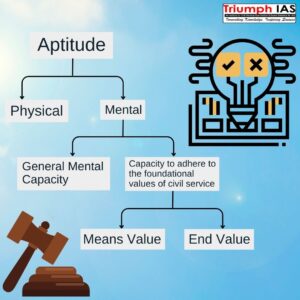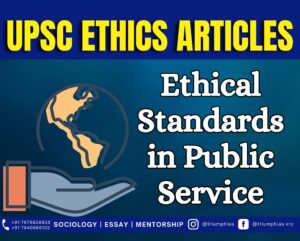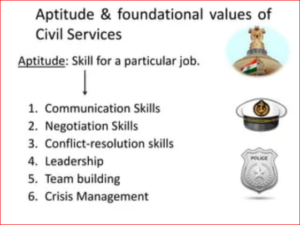APTITUDE FOR CIVIL SERVICES AND ITS ROLE
[Relevant for Public Ethics, Integrity and Aptitude]
APTITUDE FOR CIVIL SERVICES AND ITS ROLE
From an ethical standpoint, aptitude signifies the sought-after qualities within an individual concerning a particular need. For instance, civil servants ought to possess fundamental values that enable them to assess situations.
These values encompass the ability to:
- Serve as criteria for assessing circumstances.
- Align with objectives, such as social, political, and economic justice.
-
Embrace an approach founded on attributes like empathy, integrity, discipline, impartiality, and so on.
Aptitude plays a crucial role in facilitating a civil servants comprehension of their role, associated duties, and the institutional context. In general, the following types of aptitude are highly desirable in a civil servant:
- Communication Proficiency: Civil servants should possess strong communication and interpersonal skills as they often need to bring various stakeholders together to make decisions.
For example, Vikas Kumar Ujjwal, a Divisional Forest Officer in Jharkhand, collaborated with the local community and successfully transformed a Maoist-affected region into a thriving tourist destination.
- Effective Decision-Making: Civil servants must exhibit quick decision-making abilities and critical thinking skills to exercise their discretion confidently.
For example, they encounter various challenges daily, such as high unemployment, limited government spending, and rapidly changing socio-economic conditions.
- Resource Management: Given India’s resource scarcity, civil servants must be adept at resource management and act as responsible custodians of state assets.
For example, during the second wave of COVID-19, District Magistrate Rahul Kumar of Purnea, Bihar, employed ingenious strategies to secure medical oxygen and revive a malfunctioning oxygen plant in the city.
- Leadership Proficiency: Civil servants must possess strong leadership, organizational, and collaborative abilities, as their roles encompass diverse responsibilities, including decision-making and policy implementation.
An illustrative case is that of J. Meganatha Reddy, a district collector in Tamil Nadu, who initiated Project Udhayam, focusing on constructing home-based toilets for differently-abled individuals.
- Exemplary Professionalism: Maintaining exceptional standards of public administration is imperative, as civil servants form the backbone of the administrative system.
An example of this is the “Debona Nebona (won’t give won’t take) initiative” by the Cachar Silchar District Administration, which introduced drop-boxes outside government offices to combat corruption.
- Persuasive and Negotiation Skills: Proficiency in persuasion and negotiation is essential, as resistance to change or new initiatives may arise within society.
For example, Kiran Naik, a government college lecturer in Andhra Pradesh, dedicates effort to visit remote villages and convince parents to prioritize their children’s education.
- Innovative Problem Solving: Given the array of challenges civil servants encounter daily, they should possess the ability to devise innovative solutions.
In East Kameng District of Arunachal Pradesh, authorities collaborated with religious leaders, NGOs, and local influencers to address vaccine hesitancy.
- Adaptability: The focus on e-governance and the constantly evolving digital landscape necessitate adaptability.
As an example, the SVAMITVA scheme aims to incorporate Drone Surveying technology, requiring civil servants to have a fundamental understanding of this technology.
- Inclusivity: India’s socio-economic diversity necessitates civil servants to work diligently for every segment of society.
A recent initiative by Chhattisgarh police involved the induction of transgender individuals as Constables in the State Police Force.
- Optimism: Remaining optimistic instills positivity and self-confidence in civil servants, enabling them to function effectively even under extreme stress.
An instance is the “Lunch with Collector” initiative by IAS Officer Saurabh Kumar in Dantewada, which helps local students make informed career choices.

Civil servants play a vital role within the government, responsible for executing policies and ensuring efficient governance and social justice. Furthermore, they offer guidance to political leaders. Given that aptitude is an inherent capacity, it cannot be cultivated if entirely lacking within an individual’s psycho-physical framework. To excel in the crucial roles mentioned earlier, civil servants must possess these essential aptitudes.
Frequently Asked Questions:
- Question: Define the role of aptitude in civil services and its ethical significance.
Answer: Aptitude in civil services refers to the essential qualities and skills that enable civil servants to assess situations, align with objectives of justice, and uphold values like empathy and integrity. It plays a crucial ethical role in guiding their actions and decisions.
2. Question: What are some key qualities civil servants should possess to excel in their roles, as mentioned in the blog?
Answer: Civil servants should have qualities such as communication proficiency, effective decision-making, resource management, leadership proficiency, exemplary professionalism, persuasive and negotiation skills, innovative problem-solving, adaptability, inclusivity, and optimism.
3. Question: Provide an example of a civil servant who exhibited effective decision-making skills in a challenging situation.
Answer: District Magistrate Rahul Kumar of Purnea, Bihar, displayed effective decision-making by securing medical oxygen and fixing a malfunctioning oxygen plant during the second wave of COVID-19.
4. Question: How can civil servants contribute to inclusivity in their roles, as highlighted in the blog?
Answer: Civil servants can promote inclusivity by engaging in initiatives like the induction of transgender individuals into the State Police Force, as seen in Chhattisgarh.
5. Question: Explain the importance of adaptability and optimism for civil servants in today’s digital and diverse landscape.
Answer: Adaptability is crucial due to the focus on e-governance and evolving digital technologies. Optimism helps civil servants remain positive and self-confident, even in high-stress situations, allowing them to function effectively.
(Reference: Static portion)
Related Blogs …
 |
 |
To master these intricacies and fare well in the Sociology Optional Syllabus, aspiring sociologists might benefit from guidance by the Best Sociology Optional Teacher and participation in the Best Sociology Optional Coaching. These avenues provide comprehensive assistance, ensuring a solid understanding of sociology’s diverse methodologies and techniques.
Civil services, types of aptitude, civil services and its role, qualities, skills, effective governance, communication, decision-making, leadership, professionalism, problem-solving, adaptability, inclusivity, optimism, social justice, State Police Force, IAS Officer,

Choose The Best Sociology Optional Teacher for IAS Preparation?
At the beginning of the journey for Civil Services Examination preparation, many students face a pivotal decision – selecting their optional subject. Questions such as “which optional subject is the best?” and “which optional subject is the most scoring?” frequently come to mind. Choosing the right optional subject, like choosing the best sociology optional teacher, is a subjective yet vital step that requires a thoughtful decision based on facts. A misstep in this crucial decision can indeed prove disastrous.
Ever since the exam pattern was revamped in 2013, the UPSC has eliminated the need for a second optional subject. Now, candidates have to choose only one optional subject for the UPSC Mains, which has two papers of 250 marks each. One of the compelling choices for many has been the sociology optional. However, it’s strongly advised to decide on your optional subject for mains well ahead of time to get sufficient time to complete the syllabus. After all, most students score similarly in General Studies Papers; it’s the score in the optional subject & essay that contributes significantly to the final selection.
“A sound strategy does not rely solely on the popular
Opinion of toppers or famous YouTubers cum teachers.”
It requires understanding one’s ability, interest, and the relevance of the subject, not just for the exam but also for life in general. Hence, when selecting the best sociology teacher, one must consider the usefulness of sociology optional coaching in General Studies, Essay, and Personality Test.
The choice of the optional subject should be based on objective criteria, such as the nature, scope, and size of the syllabus, uniformity and stability in the question pattern, relevance of the syllabic content in daily life in society, and the availability of study material and guidance. For example, choosing the best sociology optional coaching can ensure access to top-quality study materials and experienced teachers. Always remember, the approach of the UPSC optional subject differs from your academic studies of subjects. Therefore, before settling for sociology optional, you need to analyze the syllabus, previous years’ pattern, subject requirements (be it ideal, visionary, numerical, conceptual theoretical), and your comfort level with the subject.
This decision marks a critical point in your UPSC – CSE journey, potentially determining your success in a career in IAS/Civil Services. Therefore, it’s crucial to choose wisely, whether it’s the optional subject or the best sociology optional teacher. Always base your decision on accurate facts, and never let your emotional biases guide your choices. After all, the search for the best sociology optional coaching is about finding the perfect fit for your unique academic needs and aspirations.
To master these intricacies and fare well in the Sociology Optional Syllabus, aspiring sociologists might benefit from guidance by the Best Sociology Optional Teacher and participation in the Best Sociology Optional Coaching. These avenues provide comprehensive assistance, ensuring a solid understanding of sociology’s diverse methodologies and techniques. Sociology, Social theory, Best Sociology Optional Teacher, Best Sociology Optional Coaching, Sociology Optional Syllabus.
Best Sociology Optional Teacher, Sociology Syllabus, Sociology Optional, Sociology Optional Coaching, Best Sociology Optional Coaching, Best Sociology Teacher, Sociology Course, Sociology Teacher, Sociology Foundation, Sociology Foundation Course, Sociology Optional UPSC, Sociology for IAS,
Follow us :
🔎 https://www.instagram.com/triumphias
🔎 https://www.youtube.com/c/TriumphIAS
🔎 https://t.me/VikashRanjanSociology
Find More Blogs
|
Scope of the subject and comparison with other social sciences |
|||
|
|
|
|
Modernity and social changes in Europe |


